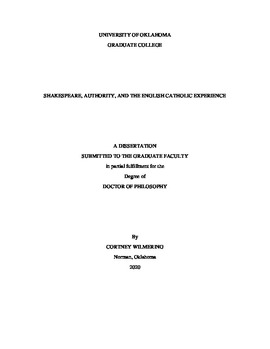| dc.description.abstract | By the time Shakespeare’s plays first appeared on stage in the late-sixteenth century, the Elizabethan campaign against English Catholics had reached its peak. However, Roman Catholicism continued to influence the English throne, the English Church, and most especially, those men and women who remained devoted to it. Through Shakespeare’s works, we can see a sharper picture of the early modern English Catholic experience and gain a new respect for the individual, political, and ecclesial interests that contributed to it. I begin with the individual in Section I, examining the experience of those who had to determine the depth of their patriotism to a state that had criminalized their religion and eliminated many of its celebrations. In chapter one, I explore Hamlet and the psychological effects of the surveillance culture that Claudius implements and that others appropriate in order to investigate one another and protect themselves. I compare this “rotten” climate of suspicion in Elsinore to Elizabethan England and the anxiety suffered by recusant Catholics as a result of state surveillance into their religious practices. In chapter two, I turn to The Merchant of Venice and its implicit gesture towards Corpus Christi, the Catholic feast that once honored the Real Presence of Christ in the Eucharist but that had been eradicated from the English church calendar after the Reformation. The play’s clearest references to Corpus Christi occur in its fixation on flesh and in its marriage trope, but these elements then also thrust to the forefront the Jewishness of Christ’s flesh and the difficulties associated with conversion. Hamlet and Merchant of Venice reflect individual English Catholics’ desire to practice their religion peacefully, without state interference in the theological teachings they espoused or the feast days they chose to commemorate.
In Section II of this dissertation, I shift away from the individual Catholic and towards the traces of Catholicism in the English monarchy and its state-run church. In chapter three, I discuss Richard II and the inherent instability of English kingship. The play frequently alludes to historical ruptures in primogenitary inheritance both before and after Richard’s abdication to Henry Bolingbroke. It also demonstrates the failure to enact sacramental permanence in the coronation ritual. Through its display of these problematic traditions, Richard argues that Christian kingship must be actively stabilized and not simply left to Providence in order to survive. Finally, in chapter four, I look at Erastian governance, the fusion of state and ecclesial authority, in Measure for Measure. In featuring a Catholic duke adopting clerical authority in the Catholic region of Vienna, Shakespeare uses a Catholic veneer to imagine the consequences of English Erastianism under James I. Through it, he hints that Erastian governors will ultimately seek political ends at the expense of their people’s spiritual needs and that religious figures who willingly suborn their church to the state fail to serve those entrusted to their care. Richard II and Measure for Measure reveal the power of the state and the church to affect individual souls and seem to insist that an autonomous church, such as Roman Catholicism, presents the most effective check on royal absolutism and its appropriation of ecclesial authority. | en_US |
